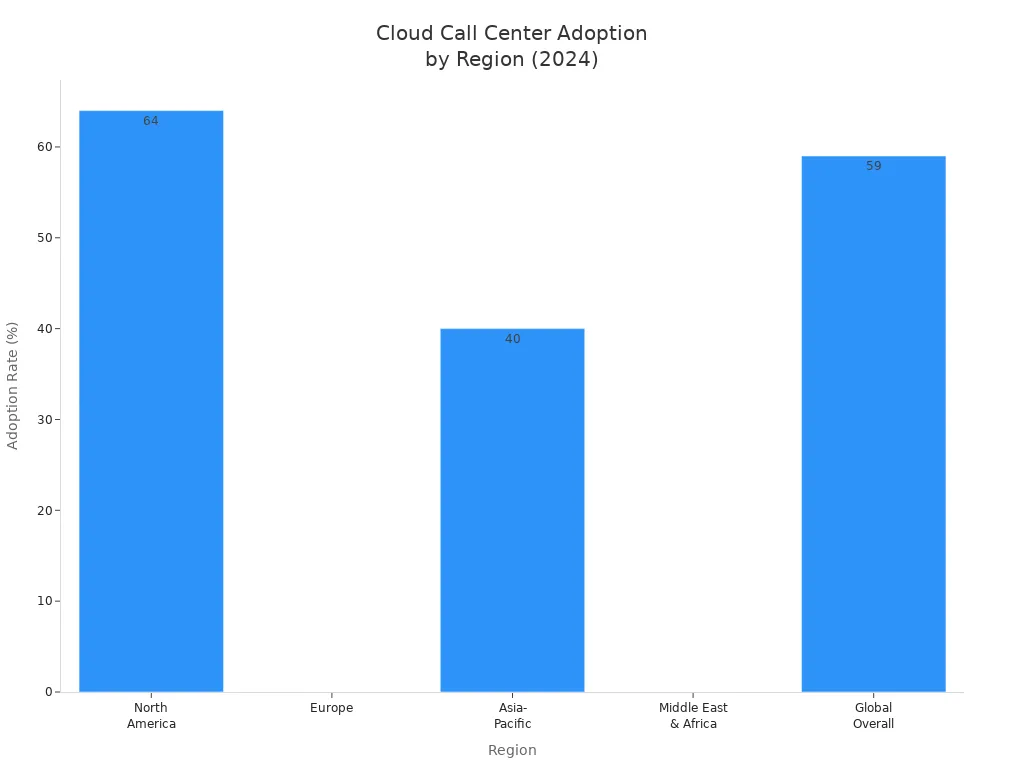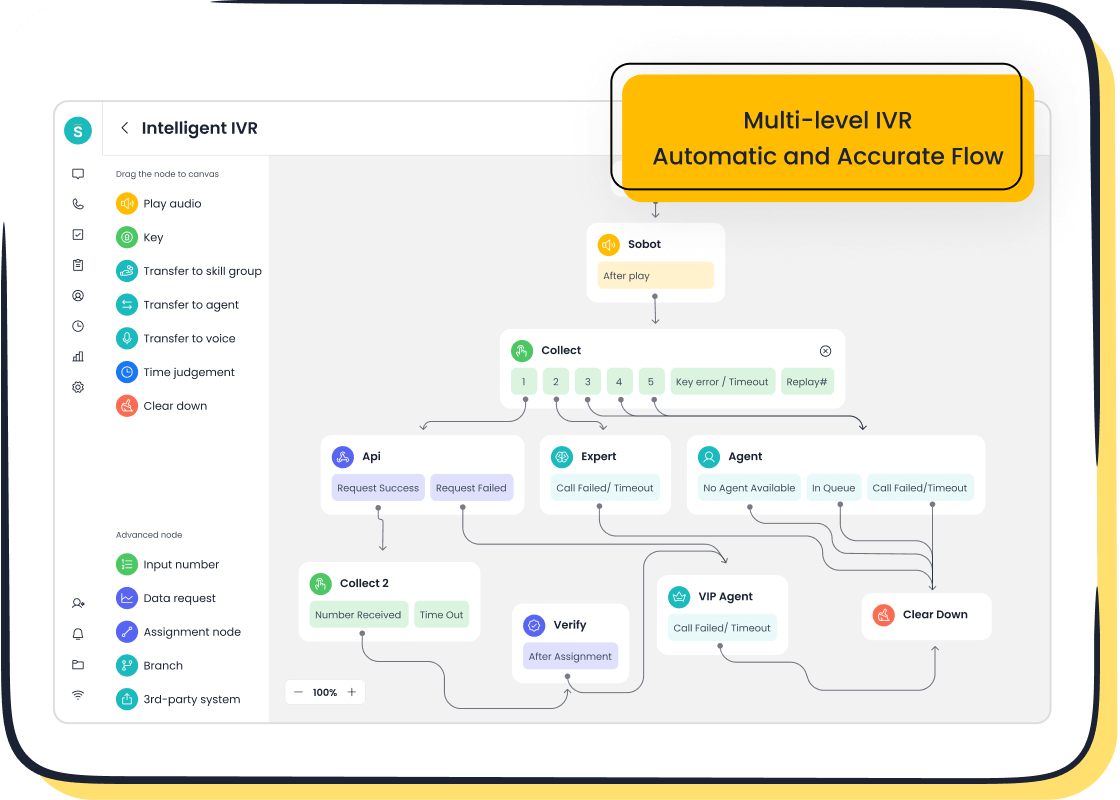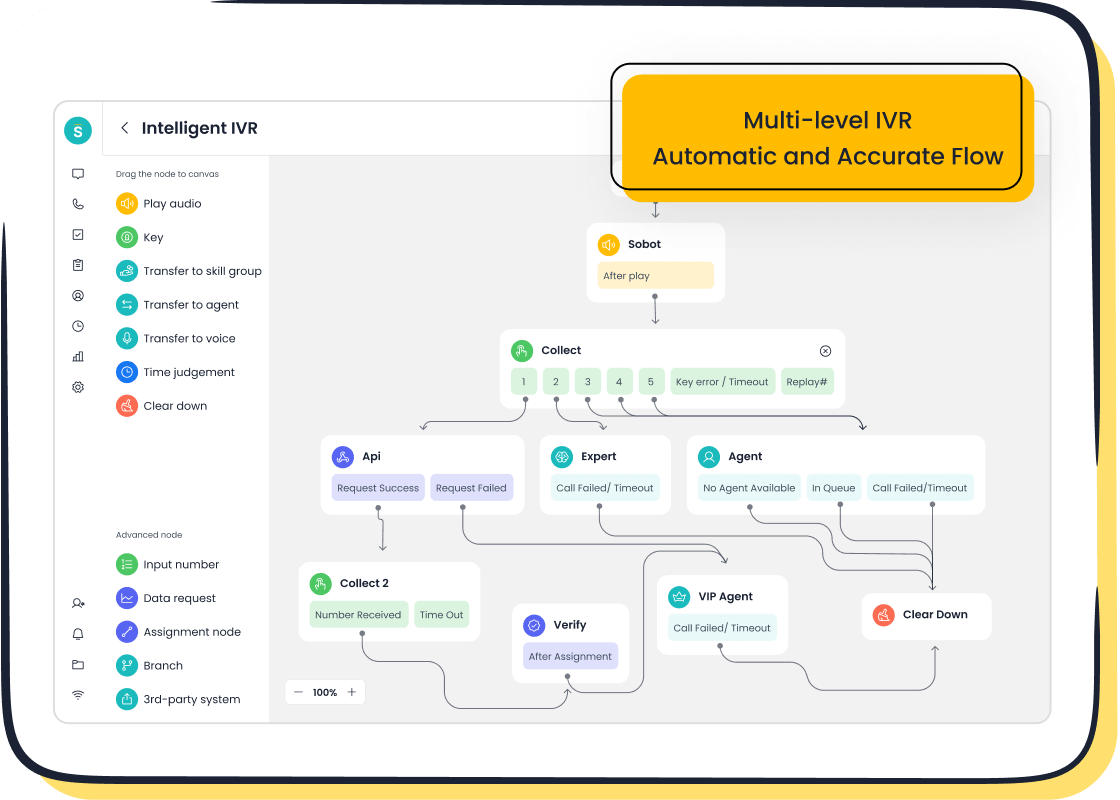Cloudcall Support for Businesses What You Need to Know

A cloud call center is a digital platform that manages customer communications service through the internet, streamlining both inbound and outbound interactions for businesses. Companies use cloudcall support to deliver faster, more responsive customer service, boost flexibility, and enhance operational efficiency. Many organizations report measurable gains:
- Customer Satisfaction Score rises with real-time speech analytics.
- First Call Resolution improves as agents access integrated tools.
- Net Promoter Score and Customer Effort Score show positive trends with smarter call routing and simplified processes.

Sobot stands out as a trusted leader in cloud call center solutions, offering advanced Sobot AI to support a seamless customer service solution and empower teams with unified cloudcall support. Businesses of any size can leverage the Sobot call center for scalable, secure, and effective customer support.
Cloud Call Center Basics

What Is a Cloud Call Center
A cloud call center is a modern solution that manages customer communications using internet-based technology. Businesses use cloud call centers to handle both inbound and outbound calls, as well as interactions across multiple channels like email, chat, and social media. This approach replaces the need for physical infrastructure and allows companies to operate virtually from anywhere.
The core functions of a cloud call center include:
- Automatic Call Distribution (ACD): Routes incoming calls to the right agents or departments based on business rules.
- Advanced Call Routing: Uses interactive voice response (IVR) and smart algorithms to direct calls according to agent skills, availability, and customer needs.
- Call Monitoring: Supervisors can listen in, coach, and intervene during live calls using features like call recording and whisper mode.
- Reporting and Analytics: Tracks real-time and historical performance metrics, offering customizable reports and speech analytics.
- Agent Productivity Tools: Provides real-time assistance, access to knowledge bases, call scripts, and workflow automation.
- Integration with Other Systems: Connects seamlessly with CRM, ERP, and marketing platforms.
- Workforce Management: Includes forecasting, scheduling, and gamification to optimize staffing.
- AI-Powered Virtual Agents: Uses artificial intelligence to handle common queries and simple transactions through voice or text.
Cloud call centers can operate as inbound, outbound, or hybrid centers. Inbound centers focus on customer inquiries and support, outbound centers handle proactive engagement like sales and surveys, and hybrid centers combine both functions for maximum flexibility.
Tip: Cloud call center technology enables businesses to scale operations quickly and support customers across the globe, all while maintaining high service standards.
Cloud vs. Traditional
Businesses often compare cloud call centers with traditional on-premise call centers to determine the best fit for their needs. The main differences lie in cost, scalability, flexibility, and operational requirements.
| Cost Aspect | Traditional (On-Premise) Call Centers | Cloud Call Centers |
|---|---|---|
| Upfront Investment | High capital expenditure for hardware, software licenses, and infrastructure | No upfront hardware costs; subscription or usage-based pricing |
| Ongoing Expenses | IT staff salaries, maintenance, support contracts, monthly phone line charges | Predictable monthly subscription fees; possible per-minute telephony charges |
| Pricing Model | Mostly fixed costs after initial investment | Subscription or usage-based (per user or per minute) |
| Scalability & Flexibility | Limited; scaling requires new hardware and licenses | Easy to scale licenses and pay for actual usage |
| Call Quality | Potentially more stable due to dedicated hardware | Dependent on internet quality; generally high with reliable connections |
| Labor & Overhead Costs | Higher due to staffing, training, and management | Reduced, especially with AI integration |
| Control & Customization | More control and customization possible | Less customizable but rapidly deployable |
| Cost Predictability | Less predictable due to maintenance and support variability | More predictable monthly costs |
Cloud call centers eliminate the need for expensive hardware and ongoing maintenance. Companies pay predictable subscription fees and can scale up or down as needed. AI-driven cloud contact centers further reduce labor costs by automating routine tasks and providing 24/7 service. For example, a midsize business with 20 agents might spend $700,000 annually on labor in a traditional setup. By switching to an AI-powered cloud-based call center, the same company could reduce costs to about $22,500 per month, while gaining round-the-clock availability and high system uptime.
Cloud contact centers also offer unmatched scalability and flexibility. Businesses can add or remove agents quickly, support remote work, and deploy new features without waiting for hardware upgrades. Traditional call centers, on the other hand, require significant investments and longer setup times to expand capacity or update technology.
| Aspect | Cloud Call Centers | Traditional Call Centers |
|---|---|---|
| Scalability | Easily increase or decrease capacity based on call volumes without physical hardware changes. | Limited scalability; requires costly and time-consuming hardware purchases or repurposing. |
| Flexibility | Agents can work remotely from any location with internet access; supports distributed workforce. | Agents tied to on-site workstations; limited mobility and remote work options. |
| Deployment | Rapid deployment with minimal physical infrastructure; quick setup. | Requires significant initial investment in physical infrastructure; longer setup times. |
| Cost | Lower initial investment; pay subscription fees; cost-effective for small businesses. | High upfront costs for hardware and maintenance; ongoing expenses for infrastructure upkeep. |
| Workforce | Enables hiring agents globally, improving customer service with diverse skills and languages. | Workforce limited to physical location; less ability to hire remote or geographically diverse agents. |
Note: Cloud-based contact centers support global teams and remote agents, making them ideal for businesses seeking agility and cost savings.
How It Works
Cloud call centers operate using cloud computing for customer service, leveraging remote servers and internet connectivity. This setup allows agents to access call center software from any device with an internet connection, whether they work from home, an office, or another country.
The technical requirements for a cloud-based call center are straightforward. Companies need reliable internet access, computers or mobile devices for agents, and cloud software for call centers. The software handles call routing, automatic distribution, caller identification, and analytics. Integration with CRM systems ensures agents have customer information at their fingertips during every interaction.
Key components of a cloud contact center include:
- Call routing and automatic distribution to manage call flow efficiently.
- Caller ID and unified customer data for personalized service.
- Real-time reporting and analytics to monitor performance.
- Omnichannel capabilities to support phone, email, chat, and social media.
- AI-powered features such as intelligent IVR and sentiment analysis.
- High system uptime (often 99.99% or higher) for reliability.
- Easy scalability and rapid deployment, often within minutes.
- Support for remote agents and global collaboration.
Cloud-based call centers use cloud-based software, which eliminates the need for physical infrastructure. Companies can deploy new features or scale operations quickly without investing in additional hardware. This flexibility allows businesses to respond to changing customer needs and market conditions with ease.
Pro Tip: Contact center as a service (CCaaS) platforms provide all the tools needed to run a cloud contact center, including voice, chat, analytics, and workforce management, all accessible through a single web interface.
Cloud call center technology empowers organizations to deliver seamless, efficient, and scalable customer service. By adopting cloud software for call centers, businesses gain access to advanced features, real-time insights, and the ability to support customers across multiple channels. This modern approach ensures companies stay competitive in a fast-changing digital landscape.
Cloud Contact Center Features
Omnichannel Support
A modern cloud contact center enables businesses to connect with customers across many channels. These channels include phone calls, video calls, SMS, email, live chat, and social media platforms like WhatsApp and Facebook Messenger. Customers can start a conversation on one channel and continue it on another without repeating information. This seamless experience improves customer support and builds trust. Sobot’s omnichannel communication platform brings all these channels together in a unified workspace. Agents see the full history of each interaction, which helps them respond quickly and accurately. Companies using cloud call center agent software can manage every touchpoint from a single dashboard, making it easier to deliver consistent service.
AI and Automation
AI-powered automation transforms how cloud contact centers operate. Intelligent routing matches customers with the best agents, reducing wait times and improving first-call resolution by up to 25%. Sobot’s AI-powered Voicebot handles routine questions, freeing agents to focus on complex issues. Real-time AI tools provide agents with instant access to customer history and suggest responses during calls. Automation also speeds up post-call tasks, such as documentation and follow-up. These features help agents resolve calls faster and increase call capacity without hiring more staff. Cloud call center agent software with AI capabilities shortens average handle time by up to 20%, leading to higher customer satisfaction and lower costs.
| Metric | Improvement Range | Business Impact |
|---|---|---|
| First-Call Resolution | 15-25% increase | Fewer repeat calls, better customer experience |
| Average Handle Time | 10-20% reduction | More calls handled, reduced operational expenses |
Analytics and Reporting
Cloud contact centers provide powerful analytics and reporting tools. These tools track key metrics such as call volume, average handle time, first call resolution, and customer satisfaction scores. Sobot’s call center software offers real-time dashboards and customizable reports. Supervisors can monitor live calls, review recordings, and coach agents using quality assurance features. AI-powered analytics detect patterns, perform sentiment analysis, and uncover root causes of customer issues. Integration with CRM systems allows companies to view customer engagement data and journey insights. Cloud-based contact center solutions use these analytics to drive continuous improvement and optimize performance.
Security and Compliance
Security and compliance remain top priorities for any cloud-based contact center. Providers must follow strict standards such as SOC 2, HIPAA, GDPR, and PCI-DSS. These certifications ensure data privacy and protection. Sobot’s call center software uses encryption for data in transit and at rest, multi-factor authentication, and role-based access controls. Regular security audits and compliance checks help maintain trust. Cloud call center agent software also supports emergency communication requirements and caller ID authentication. Businesses can rely on cloud software for call centers to keep customer data safe while delivering 24/7 support.
Tip: Choosing a cloud-based contact center with strong security and compliance features protects your business and your customers.
Business Benefits of Cloudcall Support
Cost Efficiency
Businesses seek solutions that reduce expenses while maintaining high-quality customer service. Cloudcall support delivers significant cost savings compared to traditional on-premises systems. Companies avoid large upfront investments in hardware and infrastructure. Subscription-based pricing models allow organizations to pay only for what they use.
The following table highlights the difference in costs between on-premises and cloud-based call center solutions:
| Cost Category | On-Premises Cost (Approx.) | Cloud Solution Cost (Approx.) |
|---|---|---|
| One-Time Setup Cost | $700,000 | $24,000 |
| Annual Ongoing Cost | $337,000 | $318,000 |
Larger organizations benefit even more. For example:
- 100-seat cloud-based call centers save an average of 23% compared to on-premises.
- 250-seat cloud-based call centers save an average of 34%.
- 500-seat cloud-based call centers save an average of 43%.
Sobot’s cloudcall support enables companies to optimize spending by eliminating maintenance fees and reducing IT staffing needs. Opay, a financial service platform, achieved a 20% reduction in overall costs after switching to Sobot’s omnichannel solution. These savings allow businesses to reinvest in growth and innovation.
💡 Companies using cloudcall support can scale resources up or down, ensuring they never pay for unused capacity.
Scalability and Flexibility
Cloudcall support provides higher scalability, allowing businesses to adjust operations quickly during peak demand periods. Companies can add or remove agents in real time, matching staffing levels to fluctuating call volumes. This flexibility prevents overstaffing and understaffing, optimizing costs and service quality.
Key advantages include:
- Rapid capacity increases during unpredictable demand spikes.
- Updated knowledge bases that reduce training time for new agents.
- Flexible scheduling options that improve job satisfaction and workforce stability.
- Real-time analytics for accurate demand forecasting and resource planning.
Sobot’s cloud-based call center platform supports global teams and multi-channel communication. Businesses can plan for seasonal peaks by strengthening self-service and chatbot options, deflecting routine queries and freeing agents for complex issues. Opay leveraged Sobot’s solution to manage high volumes of customer interactions across social media, email, and voice channels, resulting in a 17% increase in conversion rates.
📈 Cloudcall support enables companies to maintain agility and deliver consistent customer service, even during busy periods.
Remote Work Enablement
Remote work support has become essential for modern customer service operations. Cloudcall support allows agents to work from any location with internet access and a device. This flexibility supports fully remote and distributed teams, enhancing business continuity and resilience.
Features that facilitate remote work include:
- Collaboration tools such as team chat, call barging, and call whispering for real-time coaching.
- Centralized management features and real-time analytics for visibility and control.
- Scalability and reliability that support flexible staffing models, including gig economy agents.
- BYOD (Bring Your Own Device) environments, allowing agents to use personal devices securely.
- Geographic distribution and redundancy, ensuring uninterrupted customer service during disruptions.
Sobot’s cloud-based call center empowers managers to oversee remote agents, monitor performance, and provide support instantly. Companies can hire talent globally, improving language coverage and customer experience. Opay’s adoption of Sobot’s platform enabled its agents to handle inquiries efficiently from multiple regions, supporting users in Nigeria, Mexico, Egypt, Indonesia, and Pakistan.
🏠 Cloudcall support ensures customer service teams remain productive and connected, regardless of location.
Customer Experience
Customer experience stands at the core of every successful business. Cloudcall support enhances customer service by providing agents with integrated tools and real-time data. Companies resolve issues faster, reduce downtime, and offer personalized support across multiple channels.
Measurable improvements include:
| Measurable Improvement | Description |
|---|---|
| First Call Resolution (FCR) | Increased rates of resolving customer issues on the first call, reducing repeat contacts. |
| Average Handle Time (AHT) | Reduced average time spent per call, improving efficiency and customer experience. |
| Agent Productivity | Enhanced agent activity and utilization through better tools and analytics. |
| Real-time Customer Feedback | Collection of in-call and post-call surveys to monitor satisfaction and identify improvement areas. |
| Customer Satisfaction Trends | Tracking sentiment over time to guide strategic improvements. |
Sobot’s cloud-based call center integrates CRM software and smart call routing, helping agents resolve issues quickly. Self-service options like AI-powered chatbots and knowledge bases reduce time to resolution. Opay’s partnership with Sobot led to a jump in customer satisfaction from 60% to 90%. The unified platform allowed 60% of customers to resolve issues independently, reducing agent workload and improving overall customer support.
😊 Businesses using cloudcall support report higher customer satisfaction, increased loyalty, and improved operational efficiency.
Sobot Cloud Call Center Solutions

Key Features

Sobot delivers a robust cloud call center solution designed for businesses seeking better reliability and seamless customer engagement. The platform integrates multiple communication channels, including voice, live chat, chatbot, ticketing, and messaging, all within a unified workspace. Sobot stands out by offering WhatsApp Business API integration on the same platform, making it easier for companies to reach customers where they are most active.
Key features include:
- Unified omnichannel support for voice, chat, email, and social media.
- AI-powered chatbots and voicebots for automated, 24/7 customer service.
- Real-time analytics and customizable reporting for actionable insights.
- Seamless integration with CRM systems, knowledge bases, and third-party tools.
- High system uptime (99.99%) and strong data security with encryption and role-based access.
- Free version and trial options, making advanced call center software accessible to businesses of all sizes.
Sobot’s cloud call center solutions receive high user ratings (4.9/5), reflecting strong satisfaction and trust.
Industry Applications
Sobot’s cloud call center solutions serve a wide range of industries. Companies in retail, finance, gaming, education, healthcare, travel, and e-commerce use Sobot to manage customer interactions efficiently. The platform supports integration with websites, mobile apps, and social media, enabling businesses to deliver consistent service across every channel.
Industries benefit from:
- Intelligent chatbots for e-commerce and online banking.
- Multilingual support for global travel and hospitality brands.
- Secure, compliant communications for healthcare and government services.
- Real-time analytics and sentiment analysis for online gaming and education.
Sobot’s scalable cloud-based call center adapts to high interaction volumes, supporting both small startups and large enterprises.
Customer Success Stories
Sobot’s cloud call center solutions have transformed customer service for many leading brands. For example:
- An international luxury retailer praised Sobot for delivering a critical system upgrade in just one day, compared to six months with their previous provider.
- Sobot’s professional Customer Success Team provides personalized support, from pre-sale consultation to after-sales maintenance.
- The platform maintains high customer satisfaction (96% CSAT) and strong Net Promoter Scores (78% NPS).
Sobot’s commitment to operational excellence and rapid response times helps clients achieve measurable improvements in customer experience and efficiency.
Choosing a Cloud-Based Call Center
What to Look For
Selecting the right cloud contact center requires careful evaluation. Businesses should start by identifying their goals. The solution must align with objectives such as reducing response times or improving customer satisfaction. Ease of use and quick installation encourage adoption by teams. Real-time reporting and analytics help track key performance indicators like resolution rates and customer satisfaction.
Scalability and flexibility are essential. The platform should grow with the business and offer adaptable features. AI-powered tools, including chatbots and virtual assistants, automate routine tasks and enhance service. Omnichannel support enables seamless communication across voice, chat, email, social media, and SMS. Integration capabilities with CRM and workforce management systems are critical for smooth operations.
Customization allows businesses to tailor workflows and reports. Security and compliance protect customer data and ensure adherence to regulations such as GDPR and HIPAA. These criteria help companies choose a business communications platform that supports operational needs and enhances customer experience.
Tip: Prioritize platforms with centralized, encrypted data storage and robust access controls for maximum security.
Vendor Selection Tips
Businesses should consider several factors when choosing a vendor for their cloud contact center. Global reach and language capabilities matter for companies serving diverse markets. The vendor’s size should match the business to avoid inefficiencies. Future expansion is important; the vendor must scale with growth.
Industry experience affects training and service quality. Strong training programs improve agent performance. Technology and capital investment show the vendor’s commitment to innovation. Cost comparison should include total ownership, not just initial price. Proven track record and reliability ensure consistent service.
Security, disaster recovery, and redundancy protect operations. Personnel fit ensures the vendor’s team aligns with business needs. Intuitive platforms enhance agent engagement. Reliable customer support is critical; reviews and case studies provide insight. AI functionality improves efficiency through automation and analytics. Demos or trials allow businesses to evaluate real-world performance.
| Factor | Why It Matters |
|---|---|
| Global Reach | Supports international customers |
| Training Program | Boosts agent skills and service quality |
| Technology & Capital | Ensures access to latest features |
| Cost | Clarifies total investment |
| Security | Protects sensitive data |
| Reliability | Minimizes downtime and disruptions |
Getting Started
Transitioning to a cloud contact center involves several steps. Businesses should assess customer needs and map the customer journey. Defining success metrics, such as average speed of answer and first contact resolution, sets clear objectives. Planning a detailed roadmap guides the transition.
Clear communication with stakeholders ensures everyone understands their roles. Deploying the chosen solution introduces features like omnichannel support, analytics, and smart routing. Training agents on the new system improves adoption. Educating customers about new contact methods enhances their experience.
Monitoring performance using defined KPIs helps optimize operations. Businesses can fine-tune processes to improve customer satisfaction and efficiency. Addressing challenges such as agent retention, call volume fluctuations, and technology integration ensures a smooth transition.
🚀 Start with a trial or demo to test platform features and fit before full deployment.
Cloud call centers offer modern businesses several advantages:
- Lower upfront costs and predictable expenses
- Rapid scalability and flexibility for changing needs
- Enhanced accessibility for remote agents
- Improved reliability and business continuity
- Advanced features like AI-powered automation and real-time analytics
Sobot’s cloud call center solutions drive measurable growth. The platform boosts agent productivity by up to 30%, increases query resolution rates, and supports seamless omnichannel engagement. Businesses should evaluate their current systems, define migration goals, and assess infrastructure readiness. For those seeking to enhance operations, Sobot provides expert guidance and a free trial. Contact Sobot to embark on your contact journey.
FAQ
What is cloudcall support and how does it help businesses?
Cloudcall support uses internet-based technology to manage customer communications. Businesses gain flexibility, cost savings, and improved customer service. Sobot’s cloudcall support enables real-time analytics, omnichannel engagement, and global scalability.
Tip: Cloudcall support helps companies respond faster to customer needs.
Can Sobot cloudcall support integrate with existing CRM systems?
Sobot cloudcall support offers seamless integration with popular CRM platforms. Businesses connect customer data, automate workflows, and track interactions in one unified workspace. Integration improves agent productivity and customer experience.
| Integration Benefit | Description |
|---|---|
| Data Sync | Real-time customer updates |
| Workflow Automation | Faster ticket resolution |
How secure is Sobot’s cloudcall support platform?
Sobot’s cloudcall support platform uses encrypted data transfer, multi-factor authentication, and role-based access controls. The system maintains 99.99% uptime and follows strict compliance standards, including GDPR and SOC 2.
Security remains a top priority for cloudcall support providers.
Does cloudcall support enable remote work for agents?
Cloudcall support allows agents to work from any location with internet access. Sobot’s platform supports mobile devices and remote teams, helping businesses hire globally and maintain service continuity.
🌍 Remote work flexibility is a key advantage of cloudcall support.
What industries benefit most from Sobot cloudcall support?
Retail, finance, gaming, education, and enterprise services use Sobot cloudcall support to manage high volumes of customer interactions. Companies like Opay, Samsung, and Luckin Coffee report improved satisfaction and reduced costs.
- Cloudcall support adapts to diverse business needs.
See Also
Enhance SaaS Customer Service Using Effective Live Chat
Best Cloud-Based Contact Center Services Reviewed For 2024
Leading Live Chat Tools For Small Business Success 2024
Best No-Cost Business Chat Software Evaluated And Ranked
Analyzing Artificial Intelligence Solutions For Enterprise Call Centers
